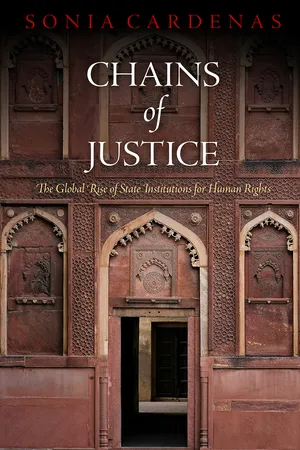
- 496 pages
- English
- PDF
- Available on iOS & Android
About This Book
National human rights institutions—state agencies charged with protecting and promoting human rights domestically—have proliferated dramatically since the 1990s; today more than a hundred countries have NHRIs, with dozens more seeking to join the global trend. These institutions are found in states of all sizes—from the Maldives and Barbados to South Africa, Mexico, and India; they exist in conflict zones and comparatively stable democracies alike. In Chains of Justice, Sonia Cardenas offers a sweeping historical and global account of the emergence of NHRIs, linking their growing prominence to the contradictions and possibilities of the modern state.As human rights norms gained visibility at the end of the twentieth century, states began creating NHRIs based on the idea that if international human rights standards were ever to take root, they had to be firmly implanted within countries—impacting domestic laws and administrative practices and even systems of education. However, this very position within a complex state makes it particularly challenging to assess the design and influence of NHRIs: some observers are inclined to associate NHRIs with ideals of restraint and accountability, whereas others are suspicious of these institutions as "pretenders" in democratic disguise. In her theoretically and politically grounded examination, Cardenas tackles the role of NHRIs, asking how we can understand the global diffusion of these institutions, including why individual states decide to create an NHRI at a particular time while others resist the trend. She explores the influence of these institutions in states seeking mostly to appease international audiences as well as their value in places where respect for human rights is already strong.The most comprehensive account of the NHRI phenomenon to date, Chains of Justice analyzes many institutions never studied before and draws from new data released from the Universal Periodic Review Mechanism of the United Nations Human Rights Council. With its global scope and fresh insights into the origins and influence of NHRIs, Chains of Justice promises to become a standard reference that will appeal to scholars immersed in the workings of these understudied institutions as well as nonspecialists curious about the role of the state in human rights.
Frequently asked questions
Information
Table of contents
- Cover
- Title
- Copyright
- Contents
- Chapter 1. The Self-Restraining State?
- Chapter 2. Historical Linkages
- Chapter 3. Tracking Global Diff usion
- Chapter 4. The Logic of Strategic Emulation
- Chapter 5. Trendsetters and Early Adopters, pre-1990
- Chapter 6. Demo cratization Scripts and Bandwagoning in Africa
- Chapter 7. Transitional Myths and Everyday Politics in the Americas
- Chapter 8. Appeasement via Localization in the Asia Pacific
- Chapter 9. Membership Rites and Statehood in the New Europe
- Chapter 10. How Accountability Institutions Matter
- Chapter 11. Adaptive States: Making and Breaking International Law
- Notes
- Index
- Acknowledgments